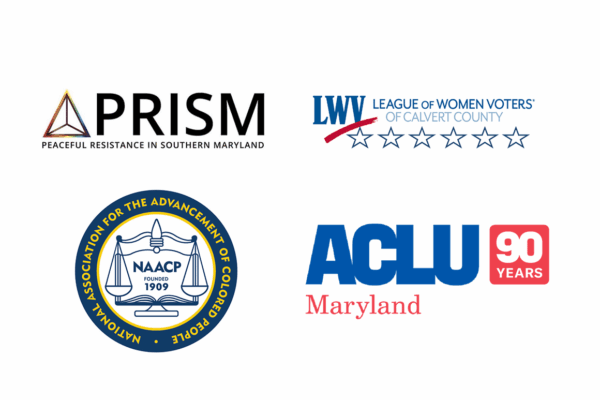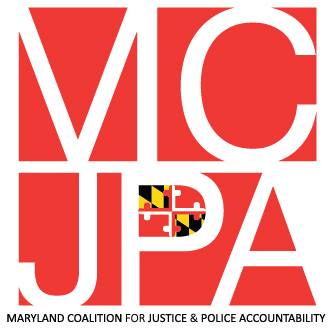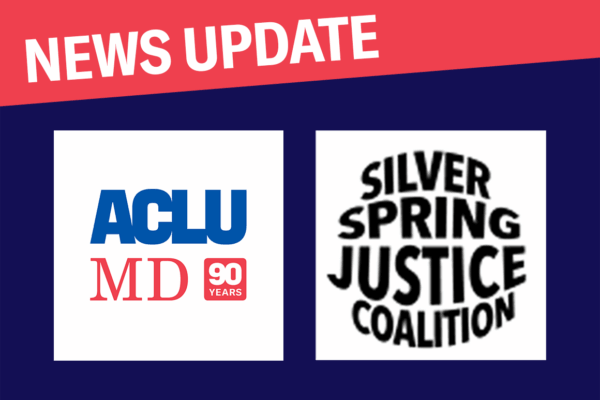UPDATED - 4/5/22
STATEWIDE, MD – Sounding the alarm as many jurisdictions across Maryland are facing persistent, dangerous efforts to block community participation and independent oversight of Police Accountability Boards (PABs), the 100+ organization Maryland Coalition for Justice and Police Accountability is issuing a statewide call to action to demand that community participation and independent investigatory powers are fully implemented in local legislation to establish Police Accountability Boards. We cannot allow an overall situation to result where Maryland has repealed the extreme Law Enforcement Officer’s Bill of Rights and it is replaced with a step backward where police are once again investigating themselves.
Implementation of Police Accountability Boards, which is required of all counties and Baltimore City, are being deliberately undermined. Since last fall, constituents in many jurisdictions across the state have been shut out of the process, including denying requests for public input before legislation was introduced.
The 2021 law requires each jurisdiction in Maryland to establish a PAB, tasked with 1. Appointing a chair or the chair’s designee and two civilian members to the administrative charging committee; 2. Appointing one civilian to their local police internal trial board; 3. Receiving complaints of police misconduct filed by members of the public; and 4. Reviewing outcomes of disciplinary matters considered by internal police charging committees.
Here are just a few examples (Anne Arundel, Baltimore City, Calvert, Prince George’s, Wicomico) of current PAB implementation across the state:
ANNE ARUNDEL COUNTY
Members of the Anne Arundel Co. Coalition for Police Accountability had worked with the County Administration for more than a year to create a civilian review board before HB 670 passed. The County Administration then used HB 670 as an excuse to throw out all of the community-centered provisions of the draft civilian review board legislation. Instead, they met with the police departments and offices of law and wrote a weak PAB bill. The Administration says they engaged the community, but all they did was meet with advocates to tell them what they plan to do. Despite the lived experience and oversight expertise in the Coalition, and two hearings packed with testimony from those who oppose the bill unless amended, the Administration hasn’t supported even one of the Coalition’s recommendations.
Joshua Hatch of the Caucus of African American Leaders said, “This bill is not all in line with best practices.” Phil Ateto, a local activist, is outraged, and said, “This bill was police-centered from the start and has been all the way through.” And Valarie Harrison said, “As someone who has experienced police brutality in Anne Arundel Co., I know that people need to have their complaints investigated by an independent PAB and not by the same police department that violated my rights.”
Get connected with the Anne Arundel Co. Coalition for Police Accountability:
- Email: aacpab2022@gmail.com
- Instagram: aaco_policeacountabilitynow
- Twitter: @AACoCoalitionf1
- Text: 667-219-2621
BALTIMORE CITY
After delays from the City in consulting with the existing Civilian Review Board, City officials, advocates, and sponsors were able to get to a tentative agreement on the House bill (HB 991), which would have guaranteed that the Police Accountability Board would have the investigatory and subpoena powers that the Civilian Review Board currently has, and independent counsel. However, the City reneged on the agreement when the bill got to the Senate, and pushed to remove the independent investigations and subpoena power from the PAB, which would result in actually backtracking on existing civilian oversight powers and contradicting the requirements from the U.S. Department of Justice Consent Decree.
Get connected with the Campaign for Justice, Safety and Jobs:
- Facebook: Campaign for Justice, Safety & Jobs
CALVERT COUNTY
The initial bill pushed for at least three retired police officers to be on the PAB, though thanks to resident advocacy commissioners reduced those numbers. Now that PAB applicants are beginning to be processed, there are concerns that Board members may potentially be subjected to fingerprinting, which is not a requirement for other Calvert boards.
“The need for police accountability in Calvert County is at an all time high as more and more families are losing family members to police violence and negligence. We have a community currently outraged that a drunken officer killed someone and was only handed a $600 fine. We have a community that has been fighting for justice for over 13 years for justice for Demetris Hall, whose family has yet to have closure of the true nature of his death. Yet the application process for the PAB has been intentionally created in a way that keeps those who see the need for accountability silenced through further intimidation.” - Calvert PRISM
Get connected in Calvert County:
Facebook: Calvert County PRISM
PRINCE GEORGE’S COUNTY
“There can be no trust or transparency when the entire community is excluded from the process!” said Beverly John, Coordinator, Prince George’s County Coalition for Police Accountability.
“No part of your life is left untouched when a loved one is wantonly killed and no one is held accountable,” said Dorothy Copp Elliott, Mother of Archie Elliot III, Directly Impacted Community Member.
"Brutality, abuse, and murder are punishable crimes in America, except when you do it with a police uniform and badge. What message are you sending citizens when the humans who swore an oath to uphold the Constitution, laws of the State, and the Charter are immune to the laws they swore to uphold? Accountability – the fact or condition of being accountable – should be performed with a veil of ignorance, without bias to anyone’s title, position, race, gender, etc. If Maryland police were supportive of accountability and able to do so successfully, William Green would still be alive. They've had since 1784 to get it right, how much more time will it take?" said Nikki Owens, cousin of William Green, Directly Impacted Community Member.
Along with other families across the State, families in Prince George’s County have suffered for decades due to the loss of loved ones killed by Prince George’s County police officers. Black and Brown communities continually suffer harm and trauma caused by police brutality as well. Information released in the “Graham Report” highlighted officers who remain on the force after receiving multiple use of force complaints and the State’s Attorneys “Brady” list of officers (again, some still on the force) who would not be called to testify in court clearly show that the police can not be trusted to investigate themselves to the benefit of the community.
While a PAB bill has yet to even be formally introduced, and no public forums have been held, the County has already finalized applicants for the board through a problematic closed door application process with biased questions including what applicants believe about “defunding” the police, whether they have ever sued police, and asking what it would take for them to acquit an officer.
Sadly, the response to the Prince George’s County Coalition received from the County Executive’s office defended the actions of the County Executive-appointed workgroup, which consists of law enforcement and local government staff, has excluded and dismissed the recommendations of the community as a whole in the implementation process.
Get connected in Prince George’s County:
- Text for updates and more info: 240-253-6791
- Twitter: @PG4PoliceReform
- Sign on to the open letter to the County Executive: bit.ly/PG4PAB
WICOMICO COUNTY
The initial bill was drafted solely in conversation with Sheriff Mike Lewis and his office, and as a result, the proposed bill has several problematic flaws that attack the very core principle of this effort. Flaws include restricting the PAB’s ability to communicate its findings with the public, failing to mandate that the diverse communities that comprise Wicomico County be reflected on the board, and mandating that the chair of the Wicomico PAB must be a retired law enforcement officer or prosecutor with over 20 years experience. These are just a few flaws that would ensure independent civilian oversight would be inherently impossible.
“Wicomico County elected officials are passing the buck to the county Sheriff to establish a police accountability board instead of the community and those who are advocating for police accountability in the first place. This process has lacked transparency and accountability every step of the way.” - Amber Green, Fenix Youth Project
Get connected in Wicomico County:
- ACLU: jschablein@aclu-md.org
- Lower Shore Progressive Caucus: admin@lowershoreprogressives.com
- Fenix Youth Project: ambergreen@fenixyouthproject.org
In 2021, the General Assembly failed to properly implement the most important element of police accountability – community oversight. While the final version of HB 670 did not establish a structure for police accountability boards that have the power to investigate, adjudicate, and impose discipline, nothing precludes local jurisdictions from strengthening the police accountability boards with investigatory powers and ensuring that the boards are community-controlled and operated entities.
The Maryland Coalition for Justice & Police Accountability is a large, diverse, statewide coalition of 100+ organizations united to demand impactful police reform. Learn more: www.mcjpa.org
###
Related Content

NAACP, League of Women Voters, PRISM, ACLU Call for Community-Led Police Accountability Board

Prince George’s County Community Calls for Halt of Recruitment for Police Accountability Board and Demands Public Input in Drafting Legislation

Montgomery County Community Rejects County Executive’s Police Accountability Board Bill and Calls for Public Input Before A New Bill is Drafted
Stay Informed
Sign up to be the first to hear about how to take action.
By completing this form, I agree to receive occasional emails per the terms of the ACLU’s privacy statement.
By completing this form, I agree to receive occasional emails per the terms of the ACLU’s privacy statement.
